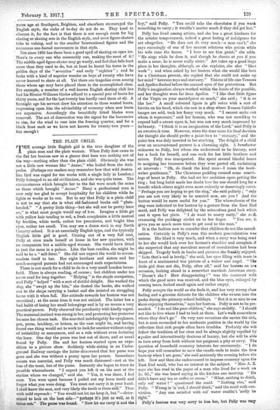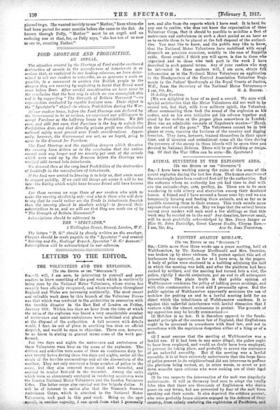THE PLAIN CHILD.
THE average little English girl is the true daughter of the plain man and the plain woman. When Polly first came to the flat her hostess saw at a glance that here was nothing out of the way—nothing other than the plain child. Obviously she was not a little new woman like " Anzac," who hailed from the Anti- - podes. (Perhaps our readers may remember how that wild Austra- lian bird was caged for ten weeks with a single lady in London.) Polly belonged to an old civilization, and she was quite tame. The circumstances which brought her to the flat were much the same as those which brought " Anzac." Many a professional man is now only too glad to accept hospitality for his children while he fights or works as he can. But to say that Polly is a plain child is not to say that she is what old-fashioned books call " plain- headed." " A pretty little thing—but she will not be pretty later on," is what most people would say of her. Imagine a little gir with yellow hair tending to red, a fresh complexion a little marred by freckles, white teeth, rather too prominent, and bright blue eyes, rather too small. You may see a dozen such in any North Country school. It is an essentially English type, and the typically English little girl is good. Coming out of a very full nest, Polly at once made herself at home in her new quarters, with no companion but a middle-aged woman. She would have fitted in just the same in a palace. Like the best candles, she might be said to be a " self-fitter." She did not expect the world to accom- modate itself to her. Her eight brothers and sisters and her much-occupied parents had not encouraged suoh expectations.
There is not much for a child to do in a very small London house- hold. There is always reading, of course ; but children under ton never read for long together. " Helping " is the staple occupation, and Polly " helped " with a sort of dutiful delight. She washed the dog, she " swept up the bits," she dusted the books, she walked out to the shops carrying a basket and she insisted on struggling home with it when full. Her attitude towards her hostess was not uncritical ; at the same time it was not unkind. The latter has a bad habit of losing her small belongings and is by no means a very practical person. Polly observed the peculiarity with kindly regret. Tho maternal instinct was strong in her, and protecting her protector became her chosen task. She searched indefatigably for eyeglasses, pen, purse, latchkey, or letters, as the case might be, and having found one thing would set to work to look for another without a sign of irritability or annoyance, and as a rule without even lecturing the loser. One day the purse was lost out of doors, and as usual found by Polly. She and her hostess started upon an expe- dition to a picture show. Suddenly while sitting in an Under- ground Railway carriage the latter discovered that her purse was gone and she was without a penny upon her person. Immediate return was essential, and Polly was much distressed—not at the loss of the treat, but of the purse. Instantly she began to trace its possible whereabouts. " I expect you left it on the seat at the station where we changed," said she. " Yes, it was there, I feel sure. You were upset because I pulled out my loose tooth and forgot what you were doing. You must not carry it in your hand. I shall know the seat, and very likely the tooth is there still." Then with mild reproach : " You would not let me keep it, but "—doter- mined to look on the best side—" perhaps it's just as well, as it turns out." The purse was found. " Now let me carry it and the
key," said Polly. "You could take the chocolates if you want something to carry ; it wouldn't matter much if they did get lost."
Polly has lived among artists, and she has a great kindness for the artistic temperament, indeed a great feeling of indulgence for art altogether. " He does not do very much—a man can't," she says excusingly of one of her nearest relations who paints while his wife runs the house. " I love to see him paint," she adds. " He sings while he does it, and though he shouts at you if you make a noise, he is never really strict." Art takes up a good large place in her thoughts, although, as she explains, she also " likes work " ; and when asked by her hostess what she would like best for a Christmas present, she replied that she could not make up her mind " between toys and statuary." Visions of life-size Vonuses and Apollos flashed before the amazed eyes of her protectress. But Polly's imagination always worked within the limits of the possible, and her thoughts were far from Apollos. " I like that little figure of the Virgin on your mantelpiece so much," she said ; " it is so like her." A small coloured figure in gilt robes with a sort of biretta on his head, which she saw in a shop where Roman Catholic images are sold, took her fancy very much. " I cannot make out whom it represents," said her hostess, who was not unwilling to expend half-a-crown upon it, but was not very much impressed by its beauty. " I think it is an imagination of the Lord," said Polly in an awestruck tone. However, when the time came for final decision she thought she should prefer a paint-box to " statuary," and the paint-box was duly inserted in her stocking. The delight of a child over an unaccustomed present is a charming sight. A benefactor unknown to Polly, but whom she understood to be literary, sent her a book for herself, and one each for her little brothers and sisters. Polly was transported. She spent several blissful hours in assigning her treasures before they were posted off, exclaiming at intervals : " Oh, do thank the kind man—I mean the book- writer gentleman." The Christmas pudding created some search- jugs of heart in Polly. She had set her ambition upon getting the ring ; but long habit made her doubt how far one should long for a benefit which others might even more ardently or deservingly covet. " Perhaps you are hoping to get the ring," she said politely ; " only you are not very likely to be married now, are you ? And the button would be more useful for you." The whereabouts of the ring were indicated to her hostess by a gesture from the East End maid, and Polly was delighted by the miraculous good luck which cast it upon her plate. " I do want to marry early," she sad, cramming the puddingy circlet on to her finger. " You see, it gives you so much more time to get used to the man."
It is the fashion now to consider that children do not like morali- zation. Certainly in Polly's case this modern gensralization was untrue. She liked it very much, and when a story was being read to her she would look over her hostess's shoulder and complain if she suspected that any succulent morsel of moralization had been skipped. Tragedy both in books and pictures she frankly enjoyed. " Lots that's sad is lovely," she said, her eyes filling with tears in front of a sentimental war picture of a widow and angel. " The little girl does not die, Polly, after all," said her hostess on on occasion, looking ahead in a somewhat mawkish American story. " Doesn't she ? How disappointing ! " was the comment with which the good news was received, and the blue eyes, enlarged by coming tears, looked small again and rather empty.
Polly accepts the world as she finds it, and has very strong class feeling and a genuine distaste for the children who swarm into the parks during the primary-school holidays. " But it is so nice to see them enjoying themselves," says her hostess. Polly is not to be per- suaded. " I do not like poor children," she says stolidly. " I should not like to live where I had to look at them. Let's walk somewhere where they don't go." On very rare occasions she envies the rich, but is soon reconciled to her moderate position in the world by the reflection that rich people often have troubles. Probably she will follow the tradition of her class and be always slightly repelled by squalor and intermittently desirous of luxury, but she will be able to turn away from both without too poignant a pity or envy. The question of household economy interests her enormously. " I do hope you will remember to save the candle-ends to make the fires burn up when I am gone," she said anxiously the evening before she left. Now and then she endeavoured to impress economy upon the East End maid, who has no interest in the subject. " Miss A. Z.
says she has read in the paper of a man who lived for a week on Gcl.," she was heard saying in the kitchen one morning. " He didn't have any tea or coffee or cocoa." "What, nothing to drink, only col' water ? " questioned the maid. " Nothing else," said Polly. " Wrong in 'is 'ead, I should think," said the maid with con- viction. " Any one satisfied with col' water couldn't 'ardly bo right." Polly's hostess was very sorry to lose her, but Polls was veg.'
pleased tago. She wanted terribly to see " Mather," from whom she bad been parted for some months before she came to the flat. As blown through Polly, "Mother " must be an angel, and an enduring one at that, for, as Polly says, "she has ten of us now to see to, counting Father."







































 Previous page
Previous page